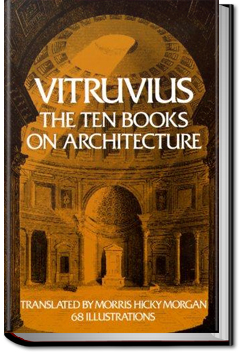

6. From such specimens we can draw our inferences with regard to the devices used in the buildings of antiquity, and conclude that they were similar.
Furthermore, as men made progress by becoming daily more expert in building, and as their ingenuity was increased by their dexterity so that from habit they attained to considerable skill, their intelligence was enlarged by their industry until the more proficient adopted the trade of carpenters. From these early beginnings, and from the fact that nature had not only endowed the human race with senses like the rest of the animals, but had also equipped their minds with the powers of thought and understanding, thus putting all other animals under their sway, they next gradually advanced from the construction of buildings to the other arts and sciences, and so passed from a rude and barbarous mode of life to civilization and refinement.
7. Then, taking courage and looking forward from the standpoint of higher ideas born of the multiplication of the arts, they gave up huts and began to build houses with foundations, having[41] brick or stone walls, and roofs of timber and tiles; next, observation and application led them from fluctuating and indefinite conceptions to definite rules of symmetry. Perceiving that nature had been lavish in the bestowal of timber and bountiful in stores of building material, they treated this like careful nurses, and thus developing the refinements of life, embellished them with luxuri
Get ALL YOU CAN BOOKS absolutely FREE for 30 days. Download our FREE app and enjoy unlimited downloads of our entire library with no restrictions.
Have immediate access and unlimited downloads to over 200,000 books, courses, podcasts, and more with no restrictions.
Everything you download during your trial is yours to keep and enjoy for free, even if you cancel during the trial. Cancel Anytime. No risk. No obligations.
For just $24.99 per month, you can continue to have unlimited access to our entire library. To put that into perspective, most other services charge the same amount for just one book!

As avid readers, we understand the joy of immersing ourselves in a captivating story or getting lost in the pages of a good book. That's why we founded All You Can Books back in 2010, to create a platform where people can access an extensive library of quality content and discover new favorites.
Since our founding days, we’ve continuously added to our vast library and currently have over 200,000 titles, including ebooks, audiobooks, language learning courses, podcasts, bestseller summaries, travel books, and more! Our goal at All You Can Books is to ensure we have something for everyone.
Join our community of book lovers and explore the world of literature and beyond!
Update
Brilliant book, brilliant author.
Even with some dated material this book (10 books on architecture by Vitruvius) shows humility, great skill and wisdom. In other words it points the reader towards learning more and not to be arrogant. It is a big step in the history of ideas. Anoth